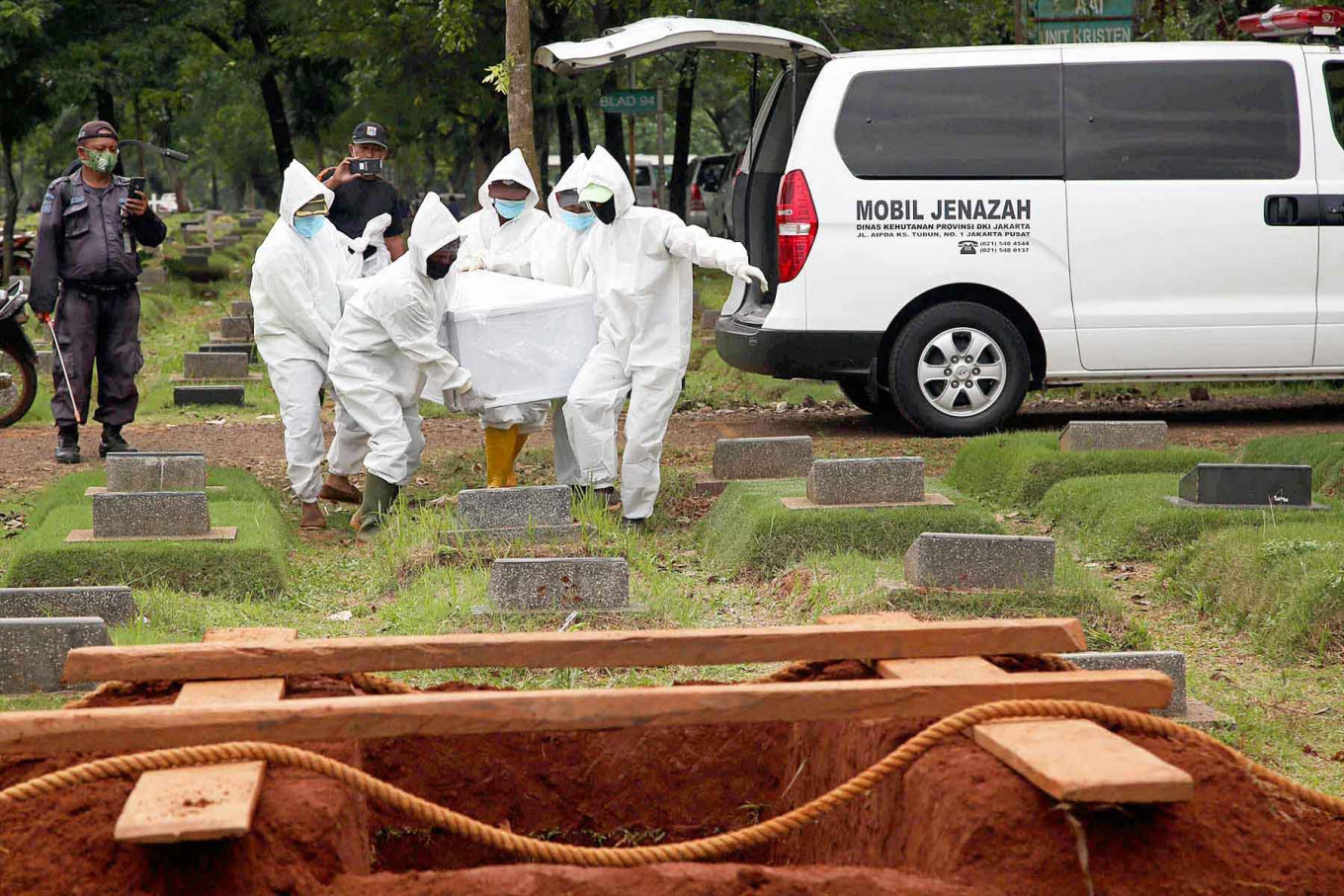Popular Reads
Top Results
Can't find what you're looking for?
View all search resultsPopular Reads
Top Results
Can't find what you're looking for?
View all search resultsTransitional PSBB extended as cases spike
Doubts linger over whether another transitional period will suffice.
Change text size
Gift Premium Articles
to Anyone
T
he Jakarta administration has announced it will extend transitional large-scale social restrictions (PSBB) until Jan. 17, despite calls to reimpose full restrictions as the capital’s healthcare system bows under strain.
Jakarta Governor Anies Baswedan said the decision was made after considering assessments by the National Disaster Mitigation Agency (BNPB) and the University of Indonesia’s Faculty of Public Health (FKM-UI).
“Based on [these assessments], we’ve decided to extend the transition from PSBB until Jan. 17,” Anies said in a statement late on Sunday.
“We’ll remain consistent in implementing the 3Ts of testing, tracing and treatment [...] to curb the spread of COVID-19, especially after the year-end holidays.”
The head of the Jakarta Health Agency, Widyastuti, said authorities would focus on preventing a surge of new cases after the holiday season.
"We need to anticipate a rise in active cases, especially following the year-end holidays," she said on Monday.
Doubts, however, linger over whether another transitional period will suffice, given the mixed signals of the city’s COVID-19 metrics.
Based on BNPB indicators, Jakarta has managed to lower its transmission risk level from high to moderate.
However, an evaluation by FKM-UI awarded Jakarta only 59 points for its ability to control the spread of the disease – a one point decrease from the previous week.
According to the university, a city should only relax its restrictions if it scores above 60 points.
As countries around the world prepare for another round of mobility curbs, Indonesia has refrained from a wholesale restriction of movement to keep the economy from collapsing.
This has come at a steep price.
The capital, as Indonesia’s first and largest outbreak epicenter, has seen an 18 percent increase in active cases over the past two weeks, from 13,066 on Dec. 20 to 15,471 on Jan. 2.
Tri Yunis Miko Wahyono, an epidemiologist from UI who is not attached to the FHM-UI evaluation team, said the government now had to choose between economic suffering or poor health care.
"Right now, the government needs to choose to sacrifice the economy for the sake of public health or vice versa. If no [significant] policy change is enacted come April or May, we all might fall into the pit of poor healthcare," Tri told The Jakarta Post on Monday.
The city expects to see a spike in new cases following the year-end holidays similar to those it experienced after two long weekends in August and October, when cases rose by 77.3 percent and 59.6 percent, respectively.
During the year-end holidays, more than 500,000 people left Jakarta by train or private vehicle, while air passengers increased by 20 percent.
Experts have expressed concern about the situation, as Jakarta’s healthcare system has been stretched thin by the pandemic.
Widyastuti acknowledged that occupancy rates at the capital’s COVID-19 referral hospitals had continued to rise, even though authorities had added more beds to accommodate an increase in patients.
On Dec. 20, the administration added 994 isolation room beds throughout the capital, bringing the total to 7,379. Some 87 percent were occupied as of Jan. 3.
The occupancy rate for intensive care unit (ICU) rooms has decreased by one percentage point to 79 percent over the past two weeks because the city has added more beds – from the initial 907 to the current 960.
The strain on the healthcare system has correlated with an increase in COVID-19 mortality, with Jakarta recording 247 deaths in the span of two weeks.
"The COVID-19 mortality rate [in Jakarta] has reached a concerning level. On Dec. 20, the total number of COVID-19 deaths was recorded at 3,087 people, but the number increased significantly to 3,334 people in two weeks," Widyastuti said.
The high number of fatalities has overwhelmed cemeteries throughout the city, and some have had to begin burying multiple bodies in the same grave as unused plots run out.
On Dec. 28, Jakarta recorded 101 burials under COVID-19 protocols, its highest single-day rate.
Dicky Budiman, an epidemiologist at Griffith University in Australia, said transitional restrictions would be effective at curbing transmission only if all of Jakarta's satellite cities enforced the policy as well.
"Maybe transitional PSBB will be sufficient for the next one or two weeks but not in the long run. On the other hand, full-scale PSBB could only work if not just Jakarta but its satellite cities and all other major cities across Java also implemented them simultaneously," Dicky told the Post on Monday.
A decision of that scale, he noted, was the responsibility of the central government.
Full PSBB involves, among other things, a strict work-from-home policy, the suspension of in-restaurant dining and further limitations on the operational hours of shopping malls and entertainment venues.
Dicky believed the policy should be secondary to a larger strategy.
The main strategy, he said, had to always be the implementation of the 3T protocols, as well as the 3M protocols of mask-wearing, hand-washing and physical distancing, which are alliterative in Indonesian.
"So far, the 3T and 3M strategies have not been effectively implemented. That's the reason the COVID-19 outbreak in Indonesia is still out of control," he said.










